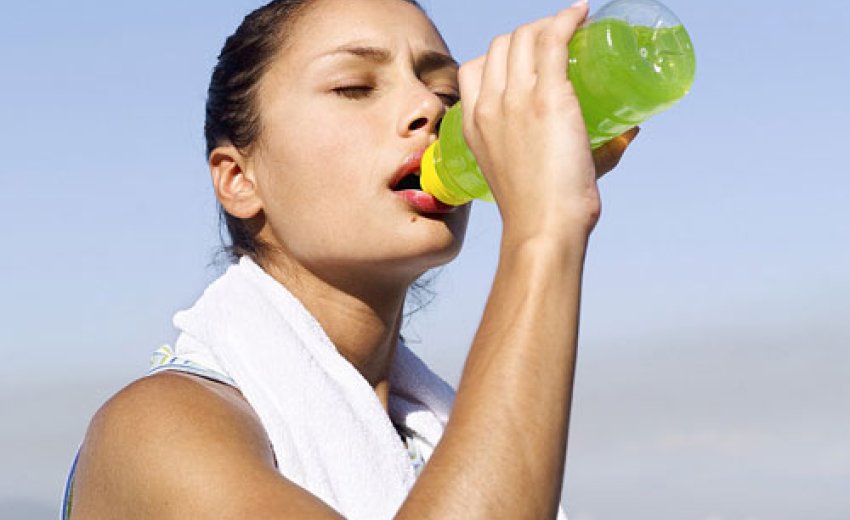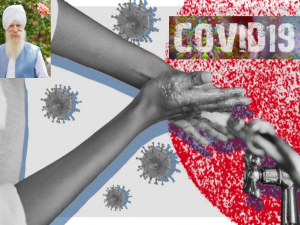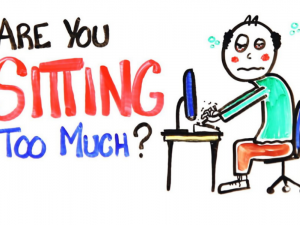Do Sports Drinks Really Work ... and Are They Healthy?
©2015 Health Realizations, Inc. Update
We won’t mention any names, but one of the country's leading sports drinks claims its “unique blend of fluid, electrolytes and carbohydrates has been shown time and again to be an optimal hydrator, keeping athletes at the top of their game.”
 Among its benefits, the sports drink’s web site says, are a
special blend of sodium, potassium and chloride that
replenishes minerals lost through sweat, along with
electrolytes to help regulate a number of body functions.
Among its benefits, the sports drink’s web site says, are a
special blend of sodium, potassium and chloride that
replenishes minerals lost through sweat, along with
electrolytes to help regulate a number of body functions.
But a closer inspection of the sports drink label reveals ingredients that are arguably not healthy at all. Among them high-fructose corn syrup, listed as the #2 ingredient after water, sucrose syrup (a sugar solution) and yellow 5, an artificial food coloring.
What’s Wrong With These Ingredients?
Most people drinking sports drinks do so because they think they’re a healthy way to rehydrate after a sports game or workout.
But downing most sports drinks is akin to downing a few cans of soda. For starters, using the ingredients from the sports drink label mentioned earlier, is high fructose corn syrup is a sweetener that may be worse for you than sugar. Many experts have, in fact, suggested that HFCS, particularly those in sweetened drinks, are at least partly responsible for the obesity epidemic in America.
When glucose is consumed, a set of reactions occur in your body allowing it to be used as energy, and production of leptin, a hormone that helps control appetite and fat storage, is increased. Meanwhile, ghrelin, a stomach hormone, is reduced, which is thought to help hunger go away.
When fructose is consumed, however, it "appears to behave more like fat with respect to the hormones involved in body weight regulation," explains Peter Havel, associate professor of nutrition at the University of California, Davis. "Fructose doesn't stimulate insulin secretion. It doesn't increase leptin production or suppress production of ghrelin.
That suggests that consuming a lot of fructose, like consuming too much fat, could contribute to weight gain."
Next, most sports drinks contain even more added sugar, which may give you a burst of energy in the short-term but will inevitably be followed by a major crash.
Yellow 5, which gives this particular sports drink its characteristic bright yellow glow, can cause allergic reactions, primarily in people sensitive to aspirin.
Research has shown that sports drinks can also erode tooth enamel, even more than carbonated cola products, especially if you sip them for long periods of time.
Drinking Sports Drinks May Negate Your Entire Workout
If you’re running a marathon or engaging in some other type of extremely intense exercise for a long period of time, the extra calories, sugar and electrolytes in a sports drink may be justifiable.
But for the average gym-goer or child in sports after school, water is sufficient to rehydrate your body.
“Unless they’re running marathons, which we do not recommend for kids, water is the best choice for quenching their thirst,” Harvard sociologist Steven Gortmaker told the Chicago Tribune.
Further, a typical 20-ounce sports drink contains about 10 teaspoons of sugar and 130 calories, which is more calories than you might burn off during your workout. For the sports drink we examined above, the label lists 14g of sugar for one-quarter of the bottle. If you drink the whole bottle, as many do after a workout, you’re downing 56g of sugar! And according to Joanna Dolgoff, a child and adolescent weight-management expert, in the Chicago Tribune, drinking one sports drink a day for one year could cause you to gain 13 pounds!
Quench Your Thirst During or After a Workout
Drinking water is one of the best ways to quench your thirst before, during and after a workout. Experts typically recommend drinking an additional two to three cups of water within two hours of finishing your workout. You should then keep drinking water regularly, as even if you don't feel thirsty it's still quite possible to be dehydrated.
Sources
About.com Effectiveness of Sports Drinks
Editor's note: This article was originally published on Aug 21st 2015





